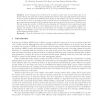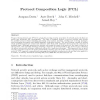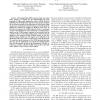3751 search results - page 89 / 751 » Events in security protocols |
PKC
2009
Springer
15 years 10 months ago
2009
Springer
A key exchange protocol allows a set of parties to agree upon a secret session key over a public network. Two-party key exchange (2PKE) protocols have been rigorously analyzed unde...
ENTCS
2007
14 years 9 months ago
2007
Protocol Composition Logic (PCL) is a logic for proving security properties of network protocols that use public and symmetric key cryptography. The logic is designed around a pro...
IANDC
2007
14 years 9 months ago
2007
Cryptographic protocols can be divided into (1) protocols where the protocol steps are simple from a computational point of view and can thus be modeled by simple means, for insta...
CORR
2010
Springer
14 years 6 months ago
2010
Springer
The Hopper-Blum (HB) protocol, which uses noised linear parities of a shared key for authentication, has been proposed for light-weight applications such as RFID. Recently, algorit...
VTC
2008
IEEE
15 years 4 months ago
2008
IEEE
— A salient feature of upcoming communication networks is unprecedented dynamicity, which can only be handled in a large scale by introducing self-configuration and self-maintena...



